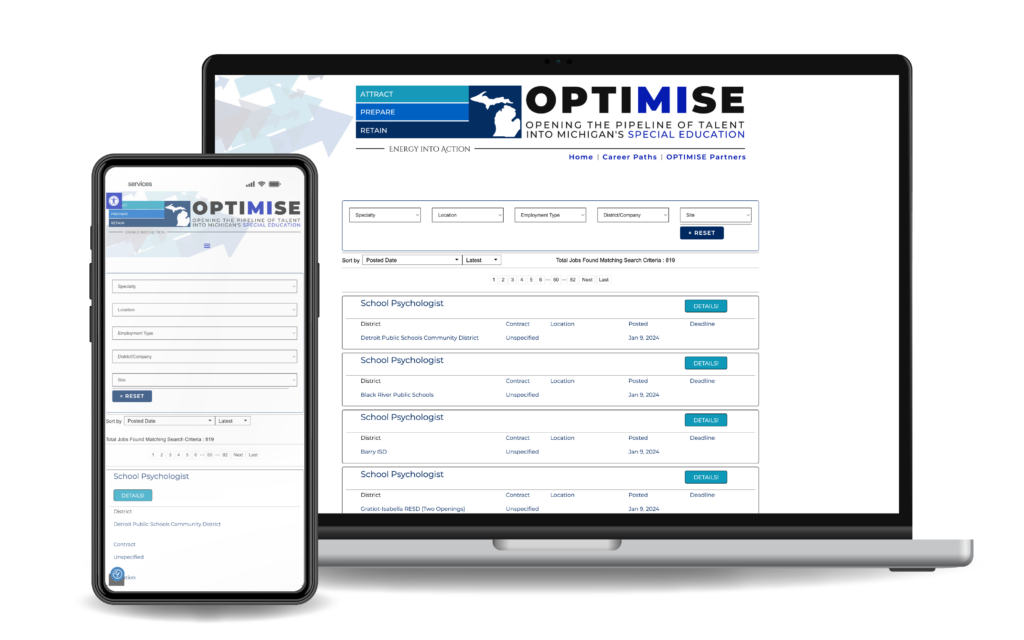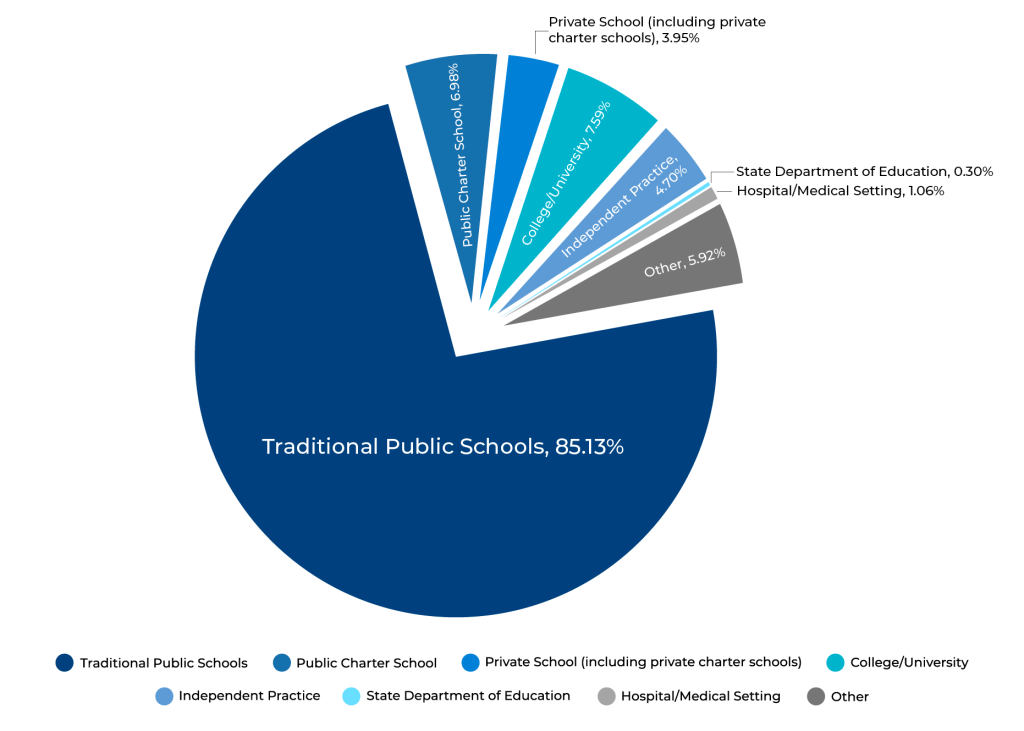Michigan’s School Psychologist
School psychologists support students, consult with teachers, families, and other professionals, such as school counselors or school social workers, to improve support strategies, work with school administrators to improve school-wide practices and policies, and collaborate with community providers to coordinate needed services. School psychologists help students, families, educators, and members of the community understand and resolve both long-term, chronic problems and short-term issues that students may face.
“Our profession looks at all the elements of a student’s world to improve their life, ” said Psychologist Vincent Hodge in St. Joe County. “Psychologists have the expertise to review a child’s life in class, at home or at play to find them a better path forward.”
School psychologists help the school improve academic achievement, promote positive behavior and mental health, support diverse learners, help to create a safe and positive environment, and they strengthen the partnership between families and schools.
A school psychologist is skilled in communication, adaptability, respect for diversity, responsibility, interpersonal relationships, and initiative in dependability.
No two days are the same.
Internship & Apprentice Postitions

Start Your Michigan School Psychologist Journey
Step 1: Earn a bachelor’s degree in any of the following areas:
- Psychology.
- Education.
- Counseling.
- Social work.
- Or similar.
Step 2: Earn a master’s degree in school psychology.
- This allows you to work in a school setting.
Step 3: Complete an internship in a school or educational setting.
Step 4: Certification.
Do you love research? Do you want the opportunity to work in schools, universities, hospitals, and clinical settings? A PhD in school psychology might be the career for you. Click here for more information about a PhD in School Psychology.
Behavioral Specialities
Board Certified Behavior Analyst
Behavior Consultant
A behavior consultant, often a Board Certified Behavior Analyst (BCBA), helps individuals and organizations understand and address challenging behaviors using principles of applied behavior analysis (ABA) to improve skills and overall quality of life.
Behavior Specialist
Behavioral Specialists assess, diagnose, and treat mental and emotional disorders of individuals through observation, interview, and psychological tests. Help individuals with distress or maladjustment understand their problems through their knowledge of case history, interviews with patients, and theory. Provide individual or group counseling services to assist individuals in achieving more effective personal, social, educational, and vocational development and adjustment. May design behavior modification programs and consult with medical personnel regarding the best treatment for patients.
Behavior Support
Research-based positive behavioral supports should be readily available in natural settings including the family home. Families, caregivers, educators, direct support personnel, and other professionals and paraprofessionals should be provided with training and support in implementing effective positive behavioral interventions and supports in all environments.
Volunteer to Gain More Experience!
Get hands-on experience and find a classroom near you that is in need of a volunteer!
Job Shadow a School Psychologist
To participate in a job shadow, reach out to a school district and request to job shadow a School Psychologist for a day.
Each school district has their own policy when it comes to job shadowing, but you may need a state ID or a driver’s license to participate.
College Program Information
Click a point on the map to find degree programs, scholarships, grants, and organizations to join!
Michigan School Psychologist Educational Funding
Free College Opportunities
Allows students to earn college credit (up to 10 courses) while in high school at no cost between 9th-12th grade. The classes that students are eligible for must not be offered by the high school or PSA and must lead towards postsecondary credit, accreditation, certification, and/or licensing.
How to apply – Students are to talk with their high school advisor on eligibility, application, deadlines, and college course options.
A Michigan Department of Education approved five-year program of study.
EMCs work closely with certain colleges to provide students with an opportunity earn a high school diploma and one or more of the following:
- 60 transferable college credits.
- An associate degree.
- A professional certification.
- The Michigan Early Middle College Association (MEMCA) technical certificate.
- Participation in a registered apprenticeship.
The Michigan Achievement Scholarship is designed to help students pursue their dreams, goals, and aspirations in the Mitten State! Graduating high school seniors are eligible to earn a skill certificate or degree at their local community college tuition-free just by filling out the new and simplified FAFSA.
State Scholarships & Grants
Michigan Reconnect is a scholarship program that pays you to attend your in-district community college tuition free or pays up to the in-district rate if you attend a community college where you’re considered out-of-district. Applicants must be 25 years old to apply.
Thirteen Promise Zones have already begun awarding scholarships. Educators, businesses, families and civic leaders are also striving to embed a pervasive culture of learning in these communities – an essential ingredient in any recipe for education success.
Amount: $2,000 – $5,500
Amount: $37,000 annually for 3 years
Federal Scholarships & Grants
Colleges and career schools use the FAFSA form to determine how much financial aid you’re eligible to receive, which could include grants, scholarships, work-study funds, and loans.You must apply for aid every year.
The Federal Student Aid Estimator provides an estimate of how much federal student aid the student may be eligible to receive. These estimates are based on the Student Aid Index (SAI), an index to determine federal student aid eligibility.
Direct Subsidized Loans and Direct Unsubsidized Loans are federal student loans offered by the U.S. Department of Education (ED) to help eligible students cover the cost of higher education at a four-year college or university, community college, or trade, career, or technical school.
A federal grant for undergraduate students with financial need.
If you’re employed by a government or not-for-profit organization, you might be eligible for the PSLF Program. The PSLF Program forgives the remaining balance on your Direct Loans
Direct PLUS loans can help pay for education expenses not covered by other financial aid. The U.S. Department of Education makes Direct PLUS Loans to eligible graduate or professional students through schools participating in the Direct Loan Program.
Grant for undergraduate students with exceptional financial need, administered directly by financial aid office at each participating school, not all schools participate
part-time employment while enrolled in school, available to undergrad, grad, and professional students with financial need, available to full and part-time students, administered by participating schools, emphasizes employment in civic education and work related to course of study or civic education, on or off campus
According to the U.S. News and World Report, school psychology is a top ranked job!
#2
in Best Social Services Jobs
#18
in Best STEM Jobs
#36
in 100 Best Jobs
Employment Settings
School Psychologist Story Tellers
Below are videos highlighting school psychologists throughout Michigan.
Find out why they love the profession.
Flushing Community Schools
Aaron, from Flushing Community Schools, is helping children with disabilities, Birth to 26, excel in school!
Sara Cole
Sara, from West Shore ESD, is helping children with disabilities, Birth to 26, excel in school and beyond! Hear her story and explore a rewarding career as a School Psychologist
Joe Zima
Joe Zima, Behavioral Specialist, help kids with a variety of behavioral or mental health needs through assessment and guided interventions to help them in school.
Jacob Daar
Jacob Daar, NMU’s director of Behavior Education, comments on the need to enhance the availability of support within the community for individuals with behavioral issues.
Cheryl Brown
Cheryl Brown, talks about how tech advances individuals with disabilities in the classroom.
Jimmy Nuse
James Nuse, Special Education Director at Ionia Public Schools, part of the OPTIMISE behavior expertise group, is working on system-level changes to help prepare special educators to work with behavior-issue individuals in the classroom.
Angela Nettleton
Principal Angale Nettles addresses the next generation of special education teachers, school psychology, and speech-language pathology to help kids in need.
Mallory Bycraft
Mallory Bycraft, Early Childhood Inclusion Support Specialist, talks about the importance of working with OPTIMISE’s behavior expertise work group.
Heather Eckner
Heather Eckner, Director of the Autism Alliance of Michigan, sees OPTIMISE and AAM work as important for ultimately helping families with individuals with disabilities.
Cheboygan-Otsego-Presque Isle
Danny, from the Cheboygan-Otsego-Presque Isle ESD, is helping children with disabilities, Birth to 26, excel in school!
A Michigan School Psychologist's Story
Matt Koekkoek of Muskegon tells a personal story that led him to help others with life struggles. It’s an amazing career path.
Behavioral Interventionist
Char-Em ISD
Eric, a behavioral interventionist, talks about the rewarding aspects and how he loves working with individuals with disabilities and their families succeed.
Mental Health Coordinator
Char-Em ISD
Alicia, a mental health coordinator, talks about how her work impacts individuals with disabilities, from birth to 26 years.
MASP Energizes Careers!
Lauren Ahlers,
MASP Regional Director
Michigan Association of School Psychologists (MASP), an amazing resource if you are or becoming a school psychologist.


